We know the story: Farmers are up before the sun — no matter the weather — and not just planting, plowing, harvesting. They’re fixing the tractor, managing livestock, keeping up with endless paperwork. As romantic as the idea of farming may seem, it’s not all sunsets and fields of flowers.
 Yet I have an affinity for farmers. My grandfather was a farmer in Harford County, and he raised feed crops, vegetables, pigs, chickens, cows for milk and more. My grandmother regularly churned butter, preserved wild berries and
Yet I have an affinity for farmers. My grandfather was a farmer in Harford County, and he raised feed crops, vegetables, pigs, chickens, cows for milk and more. My grandmother regularly churned butter, preserved wild berries and
seasonal produce and slaughtered chickens for supper. I never met either of them but grew up hearing their story, and I am sure that my love for cooking, having a small vegetable garden and city chickens, comes from my grandparents.
Culturally, I am not unique as support for farmers and local farming flourishes. Community-supported agriculture (CSA) memberships have been steadily growing for the last several years, according to the USDA. Investing in a local farm and knowing how the produce is grown and exactly where our food comes from are important values for American consumers. With that in mind, here’s a look into the world of six small family farms that supply restaurants, markets and CSAs in our area.
GRAND VIEW FARM, Forest Hill
Grand View Farm began in 2010 with one heifer and 25 egg layers and began selling its offerings two years later. Nick Bailey and his father, Wil, were inspired to start farming their land after visiting a grain farm in Virginia that was chemical free.
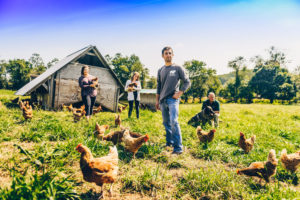 In the beginning, they sold a few dozen eggs from the farm each Saturday. From there, they added more eggs, broilers, pigs and cattle. Typical of an operation that supplies local consumers interested in local product, the cattle are grass fed, while the chickens and pigs get a custom non-GMO mix of grains to supplement their pasture diet of grasses, bugs, roots “and everything that makes for happy pigs and chickens,” Bailey says.
In the beginning, they sold a few dozen eggs from the farm each Saturday. From there, they added more eggs, broilers, pigs and cattle. Typical of an operation that supplies local consumers interested in local product, the cattle are grass fed, while the chickens and pigs get a custom non-GMO mix of grains to supplement their pasture diet of grasses, bugs, roots “and everything that makes for happy pigs and chickens,” Bailey says.
“I really love our pasture-raised eggs. It can be hard to show a visual difference with nutrient-dense ground beef or humanely raised pork,” Bailey says. “But an orange-yolked egg that stands high out of the white might be the
single best example of how different this food is from its commercially raised counterpart.”
Bailey also rolled out a new home-delivery and subscription service this year and continues to sell most of his pork to John Brown General & Butchery in Cockeysville and Primal Supply in Philadelphia, part of a resurgence of Main Street butcher shops. They also supply Uncle’s Hawaiian Grindz in Fallston and Wet City in Baltimore.
Also, like many farms, this one is a family venture. “Dad and I are there each day, but we have a big support system around us,” Bailey says. “There is no way the farm would exist like it does today without everyone who has helped us along the way. My wife, Brittany, my mother, Elizabeth, and my sister, Caroline, are all fixtures on the farm. It’s a team effort for sure.”
KARMA FARM, Monkton
Jon Shaw has been growing organic vegetables for quite a while, but his
business epiphany hit eight years ago.
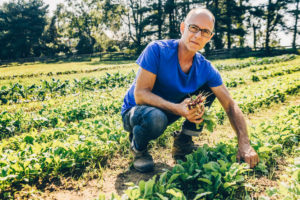 “I had a huge bumper crop of stuff that I couldn’t give away to neighbors in Monkton,” he says. “I put it in baskets and went down to the Avenue in Hampden and sold them door to door. The restaurants asked me to come back — and the farm was born.”
“I had a huge bumper crop of stuff that I couldn’t give away to neighbors in Monkton,” he says. “I put it in baskets and went down to the Avenue in Hampden and sold them door to door. The restaurants asked me to come back — and the farm was born.”
Shaw farms four of the 12 acres he owns but also uses hoop houses to extend the produce season. Last year, he bought an indoor hydroponic unit that allowed him to grow leafy greens and herbs all year. This year, Karma Farm started an urban farm next to Sandlot in Harbor Point with two large hoop houses for 52-week production and a more advanced hydroponic unit. The expected yield: about 1,000 heads of lettuce a week.
Karma sources to all of Woodberry Kitchen’s Foodshed locations and others, including Magdalena, Rye Street Tavern, Bottega, Corner Pantry, Foraged and Chez Hugo in Baltimore as well as A Rake’s Progress, Bresca and Tail Up
Goat in Washington, D.C. The farm provides a lot of specific crops for restaurants “like weird hot peppers for sauces,” which Shaw says makes the work both personal and fun.
“To me, the best thing about being a farmer is growing beautiful and healthy food,” he says. “The hardest thing is definitely the extreme weather — heat, cold, wind, drought and flood.”
TWO BOOTS FARM, Hampstead
For Elisa Lane, it all started in Reservoir Hill. “A few of my neighbors and I decided to start a farm on a vacant piece of land in our neighborhood next to the community garden — that was the beginning of the Whitelock Community Farm,” she says. “I became the farm manager and started interning at an organic farm in Baltimore County. Soon, I was in deep and started looking for land to start Two Boots Farm.”
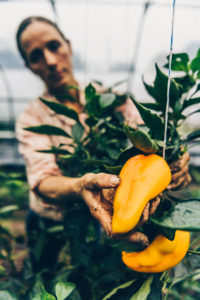 The parcel she found is small by most farm standards, 15 acres, and mostly wooded, so “we have to be scrappy and are constantly trying to refine our practices to get the most yield.” Two Boots has 1 ½ acres in production with vegetables, fruits and flowers plus a “decent-sized” pawpaw orchard with more than 100 trees. The result is a “cross between a farm and a giant garden.”
The parcel she found is small by most farm standards, 15 acres, and mostly wooded, so “we have to be scrappy and are constantly trying to refine our practices to get the most yield.” Two Boots has 1 ½ acres in production with vegetables, fruits and flowers plus a “decent-sized” pawpaw orchard with more than 100 trees. The result is a “cross between a farm and a giant garden.”
Lane enjoys collaborating with chefs and works with Helena Keefe del Pesco at Larder in Baltimore’s Old Goucher neighborhood and Meaghan and Shane Carpenter at Hex Ferments.
“Helene’s very inspired by her travels. When she shows me what she’s interested in having me grow for her, sometimes I don’t know half the produce on her list — this keeps me engaged for sure,” Lane says. “Growing the same thing over and over can get a little boring. I like learning new things and tasting new flavors.”
LIBERTY DELIGHT FARMS, Reisterstown
Shane Hughes grew up on a small farm but did not plan on being a farmer. He played football in college, earned his C.P.A. and worked for many years in the corporate world, managing people and company assets. When the 2008 financial crisis hit, Hughes was scheduled to move to New York. He balked.
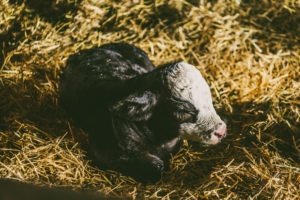 “Right around then, I had been spending time at my uncle’s farm and decided it was time to make a big change. The farm was calling,” he says. “Fast forward nine years and I’m proud to successfully carry on my family’s legacy and build my dream.”
“Right around then, I had been spending time at my uncle’s farm and decided it was time to make a big change. The farm was calling,” he says. “Fast forward nine years and I’m proud to successfully carry on my family’s legacy and build my dream.”
His farm sits on just shy of 100 acres near preserved land in Reisterstown and has eight pastures, a natural stream, more than 200 head of cattle, about 50 Berkshire pigs and hundreds of chickens and rabbits. Not surprising, considering his business background, his client list is long: Woodberry Kitchen’s Foodshed locations, La Cuchara, Dooby’s, The Brewer’s Art, Blacksauce Kitchen, Haenyo and Well Crafted Pizza as well as Swizzler and Timber Pizza in Washington, D.C. Hughes also works with culinary students through the University of Maryland Eastern Shore.
“My favorite part of the day is definitely the end. [My wife] and I have lounge chairs that overlook the pastures, where we sit surrounded by our dogs and take in all that we did that day,” he says. “It sometimes seems insurmountable, but somehow we got it done. … I honestly do have a dream come true.”
ANDY’S EGGS & POULTRY, Fallston
Andy Bachman’s farm was a wedding gift to his great-grandparents. His grandfather raised chickens from the 1940s to the 1960s, and his father raised hogs for Esskay and sold produce at the Baltimore Wholesale Produce Market.
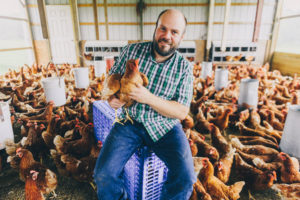 “I grew up around agriculture — it’s all I’ve ever wanted to do,” Bachman says. “I started a greenhouse business during high school and sold plants at farmers’ markets. We started raising chickens again in 2004.
“I grew up around agriculture — it’s all I’ve ever wanted to do,” Bachman says. “I started a greenhouse business during high school and sold plants at farmers’ markets. We started raising chickens again in 2004.
The long hours can be rough, he admits. There is always something that needs to be done, he says, and it always feels like there is never enough time.
But his products earn high praise at places like Blacksauce Kitchen, Between 2 Buns, Big Bean Theory, Brewer’s Art, Red Canoe Cafe and Sunshine Grille. He sources to a few local grocery stores and to two companies that provide home-delivery services around the Baltimore area. On the weekend, you can find him or his staff at the Waverly or Bel Air farmers’ markets.
“To get it all done, we hire help to work at the farmers’ markets. They have become like family members,” he says.
ONE STRAW FARM, White Hall
Drew Norman always wanted to be a farmer and grew up looking over the fence at the neighboring dairy farm.
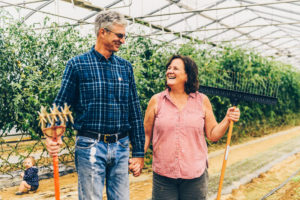 In high school and college, he spent time working on farms, and when he met his wife, Joan, he was working on a dairy farm.
In high school and college, he spent time working on farms, and when he met his wife, Joan, he was working on a dairy farm.
“So, I happened to fall in love with a man who wanted to be a farmer,” Joan says. “I love his dream and do all I can to be part of it and support it.”
She joined the farm when it was too much for Drew to manage on his own. Now the effort includes son Andrew and son-in-law Mark, and the farm is
in its 35th year. The family owns 115 acres and rents more than 150 from neighbors and Drew’s sister.
“It’s amazing to plant a seed and see it grow into food,” Drew says. And, Joan adds, “when a customer smiles and loves the food you grew for them, it makes you feel like you won the lottery.”
Photos by David Stuck




